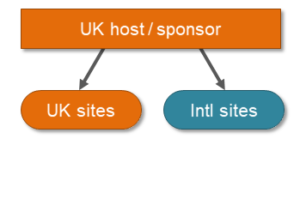
The host institution/sponsor contracts with all international research sites.
Advantages
An advantage of the sponsor contracting with each research site is that there is greater control over the content of the individual research agreements, and to an extent, the time taken for these contracts to be reviewed. There also wouldn’t be the need to finalise a spoke contract prior to starting contracting with individual research sites.
Disdvantages
Negotiation of research agreements for international sites has a significant impact on staff resource required to manage this in comparison to a trial being run in the UK alone, not only in time required but also level of seniority of staff to conduct these negotiations. This is particularly an issue when there are a number of international sites involved in the trial. It is recommended that this is taken into account when
costing a trial grant to ensure appropriate staffing and timelines in relation to the number of contracts involved.
It is recommended where possible the contracts between the UK host institution and participating research sites are in English. It is common practice for parties from different countries to use contracts in English as this is the most commonly used contractual language. This will help to facilitate contract negotiations. Translating this document will incur additional translation costs (and time to obtain this translation), and may require specialist companies to perform this translation so any legal meaning is not lost in translation.
Working with a translated document will significantly increase the amount of time required for contract negotiation. If a translated contract is insisted upon, one option is to complete contract negotiations with an English version of the document and once finalised, arrange for a translated copy to be signed in conjunction with the English version. This will act to avoid any misunderstanding with the contract, however it should be noted in both agreements that the English version would prevail in case of dispute.
It would be beneficial to develop a template research agreement for international sites for use across the trial as this will help to reduce the time required for contract negotiations. If an organisation already has experience in running international trials, this template can be adapted based on prior experience of what has been acceptable and not-acceptable in previous trials. There are a number of factors that will impact what needs to be included within an international research agreement including:
- Funder requirements: are there any terms from the main funding agreement that are required to be filtered down to any sub-contracts in order for the host institution to remain compliant with the main funding agreement with the funder?
- Insurance provisions: level of insurance, and what this would cover, from the host institution for the trial should be clearly detailed within the agreement in addition to listing any local insurance requirements for sites. Types and levels of insurance required will depend on the overall risk of the trial (link to insurance section)
- Clear division of responsibilities between both parties: It is recommended if possible that research sites are responsible for obtaining all necessary ethical, regulatory or other approvals required for conduct of the trial at their site, in addition to being responsible for any local reporting that may be required by applicable laws, regulations and/or guidelines
- Local/national legislation differences: Differences in legislation should be considered when developing the research agreement for international sites. This includes, but is not limited to, data protection, clinical research and good clinical practice (GCP).
Common areas for disputes with international research agreements include:
- Jurisdiction of agreement/governing law: For a UK host institution, the starting position would usually be to state the agreement will be governed by the local national laws and any dispute will be subject to the jurisdiction of the local national courts e.g. the English Courts. Sites may wish to change this to reflect their local governing laws, however it would be preferable to agree to remain silent on jurisdiction if this is the case.
- Warranties, indemnity and insurance clauses: this may be disputed if sites are unable to comply with local insurance requirements detailed in the trial agreement e.g. they may hold the required insurance but not to the level stipulated in the agreement. In this case, it will need to be assessed whether the site can take part in the trial with the level of insurance held.
- Intellectual property rights
- Publication rights: Will sites be able to publish data relating to their own patients prior to the trial be analysed? It is recommended that a publication policy for the trial is agreed by the Trial Management Group
- Financial payment schedule: Will payments be made on a regular basis throughout the trial, or as a bulk payment at the end of the trial?
It would be beneficial to establish within the host organisation what would be the minimum level that would be acceptable for each of these points so these can be effectively negotiated.
A breakdown of any payments being made to an international organisation should be clearly detailed within the contract, specifying what this covers/should be used for. It is recommended that payments to international are paid in the same currency as the main grant. This removes the risk of being exposed to an adverse fluctuating currency rate should this change through the lifetime of a trial. If you are required to make payments in local currency, considerations should be given to the payment schedule to minimise the risk where possible e.g. making regular payments throughout the grant rather than leaving all payments to the end of the trial.
Another option is to make the payment upfront upon signature of the agreement, however whilst this may reduce the risk of experiencing an adverse currency fluctuation, this does pose another risk in that it may be difficult to recoup any money paid if the sites do not then go onto fulfil their role in the trial.